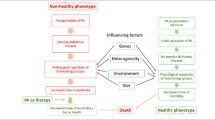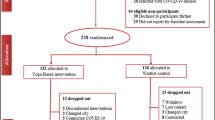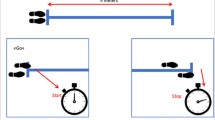Abstract
Objective
To examine the association between baseline frailty measurements and cognitive function 4 years later.
Design
Prospective observational study.
Setting
Community.
Participants
Two thousand seven hundred and thirty seven cognitively normal older adults.
Measurement
The appendicular muscle mass (ASM), hand grip strength, timed chair-stand test, walking speed and step length were measured at baseline. The Minimental state examination (MMSe) was administered at baseline and 4 years later.
Results
In men, all baseline frailty measurements, namely, being underweight, lower ASM, weaker grip strength, slower chair-stand test, shorter step length, slower timed walk were significantly associated with a lower MMSe score 4 years afterwards. After adjustment for age, years of education and baseline MMSe score, ASM and timed walk became insignificant. In women, all frailty measurements except underweight and low ASM were significantly associated with MMSe score 4 years later. Moreover, only weaker grip strength persisted to be significant after adjustment for age, years of education and baseline MMSe score.
Conclusion
Physical frailty, as represented by being underweight, weaker grip strength, slower chair-stand test, shorter step-length in men and weaker grip strength in women, was associated with cognitive decline over a four year period.
Similar content being viewed by others
References
Fried LP, Tangen CM, Walston J et al for the Cardiovascular Health Study Collaborative Research Group. Frailty in older adults: evidence for a phenotype. J Gerontol Biol Sci Med Sci 2001;56A:M146–M156
Fried LP, Ferrucci L, Darer J, Williamson JD, Anderson G. Untangling the concept of disability, frailty, and comorbidity: implications for improved targeting and care. J Gerontol Biol Sci Med Sci 2004;59(3):255–263
Rockwood K, Stadnyk K, MacKnight C, McDowell I, Hebert R, Hogan DB. A brief clinical instrument to classify frailty in elderly people. Lancet 1999;353:205–206
Rockwood K, Song X, MacKnight C, Bergman H, Hogan DB, McDowell I, Mitnitski A. A global clinical measure of fitness and frailty in elderly people. CMAJ 2005;173(5):489–495
Abellan van Kan G, Rolland Y, Bergman H, Morley JE, Kritchevsky SB, Vellas B on behalf of the Geriatric Advisory Panel. J Nutr Health Aging 2008;12(1):29–37
Boyle PA, Wilson RS, Buchman AS et al. Lower extremity motor function and disability in mild cognitive impairment. Exp Aging Res 2007;33(3):355–371
Franssen EH, Souren LE, Torossian CL, Reisberg B. Equilibrium and limb coordination in mild cognitive impairment and mild Alzheimer’s disease. J Am Geriatr Soc 1999;47(4):463–469
Auyeung TW, Kwok T, Lee J, Leung J, Leung PC, Woo J. Functional decline in cognitive impairment — the relationship between physical and cognitive function. neuroepidemiology 2008;31:167–173
Camicioli R, Howieson D, Oken B, Sexton G, Kaye J. Motor slowing precedes cognitive impairment in the oldest old. Neurology 1998;50:1496–1498
Wang L, Larson EB, Bowen JD, van Belle G. Performance-based physical function and future dementia in older people. Arch Intern Med 2006;166:1115–1120
Alfaro-Acha A, Snih SA, Raji MA, Kuo YF, Markides KS, Ottenbacher KJ. Handgrip strength and cognitive decline in older Mexican Americans. J gerontol A Biol Sci Med Sci 2006;61A(8):859–865
Buchman AS, Boyle PA, Wilson RS, Tang Y, Bennett DA. Frailty is associated with incident Alzheimer’s Disease and cognitive decline in the elderly. Psychosom Med 2007;69:483–489
Abellan van Kan G, Rolland YM, Morley JE, Vellas B. Frailty: toward a clinical definition. J Am Med Dir Assoc 2008;9(2):71–72
Cruz-Jentoft AJ, Baeyens JP, Bauer JM et al: Sarcopenia. european consensus on definition and diagnosis. Age and Ageing 2010;39: 412–423
Folstein MF, Folstein SE, McHugh PR. ’Minimental state’. A practical method for grading the cognitive state of patients for the clinician. J Psychiatr Res 1975;12:189–198
Prince M, Acosta D, Chiu H, et al and the 10/66 Dementia Research Group. Dementia diagnosis in developing countries: a cross cultural validation study. Lancet 2003;361: 909–917
Chan TS, Lam LC, Chiu HF, Prince M. Validity and applicability of the Chinese version of community screening instrument for dementia. Dement geriatr Cogn Disord 2003;15: 10–18
Heymsfield SB, Smith R, Aulet M, et al. Appendicular skeletal muscle mass: measurement by dual-energy X-ray absorptiometry. Am J Clin Nutr 1990;52:214–218.
Auyeung TW, Lee JS, Leung J, Kwok T, Leung PC, Woo J. Survival in older men may benefit from being slightly overweight and centrally obese—a 5-year follow-up study in 4,000 older adults using DXA. J gerontol A Biol Sci Med Sci 2010;65A(1):99–104.
Aguero-Torres H, Fratiglioni L, Gou Z, Viitanen M, Strauss E, Winblad B. Dementia is the major cause of functional dependence in the elderly: 3-year follow-up data from a population-based study. Am J Public Health 1998;88:1452–1456.
Raji MA, Kuo Y, Snih SA, Markides KS, Peek KM, Ottenbacher KJ. Cognitive status, muscle strength, and subsequent disability in older Mexican Americans. J Am geriatr Soc 2005;53:1462–1468.
Atkinson HH, Rosano C, Simonsick EM et al, Health ABC study. Cognitive function, gait speed decline, and comorbidities: the health, aging, and body composition study. J gerontol A Biol Sci Med Sci 2007 Aug;62(8):844–850
Visser M, Pahor M, Taaffe DR et al. Relationship of interleukin-6 and tumor necrosis factor with muscle mass and muscle strength in elderly men and women: The Health ABC Study. J gerontol A Biol Sci Med Sci 2002;57A:M326–M332
Weaver JD, Huang MH, Albert M et al. Interleukin-6 and risk of cognitive decline. MacArthur Studies of Successful Aging. Neurology 2002;13: 371–378
Baumgartner RN, Waters DL, Gallagher D, Morley JE, Garry PJ. Predictors of skeletal muscle mass in elderly men and women. Mech Ageing Dev 1999;107:123–136
Yaffe K, Lui LY, Zmuda J et al. Sex hormones and cognitive function in older men. J Am geriatr Soc 2002;50:707–712
Iannuzzi-Sucich M, Prestwood KM, Kenny AM. Prevalence of sarcopenia and predictors of skeletal muscle mass in healthy, older men and women. J gerontol Med Sci 2002;57A:M772–M777
Morley JE, Kim MJ, Haren MT. Frailty and hormones. Rev endocr Metab Disord 2005;6:101–108
Ottenbacher KJ, Ostir GV, Peek MK, Al Snih S, Raji MA, Markides KS. Frailty in Mexican American older adults. J Am geriatr Soc 2005;53(9):1534–1531
Visser M, Newman AB, Nevitt MC et al for the Health ABC study research group. Reexamining the sacopenia hypothesis: muscle mass versus muscle strength. Ann N Y Acad Sci 2000;904:456–461
Visser M, Goodpaster BH, Kritchevsky SB et al for the Health ABC study research group. Muscle mass, muscle strength, and muscle fat Infiltration as predictors of incident mobility limitations in well-functioning older persons. J gerontol 2005;60A:324–333
Author information
Authors and Affiliations
Corresponding author
Rights and permissions
About this article
Cite this article
Auyeung, T.W., Lee, J.S.W., Kwok, T. et al. Physical frailty predicts future cognitive decline — A four-year prospective study in 2737 cognitively normal older adults. J Nutr Health Aging 15, 690–694 (2011). https://doi.org/10.1007/s12603-011-0110-9
Received:
Accepted:
Published:
Issue Date:
DOI: https://doi.org/10.1007/s12603-011-0110-9




